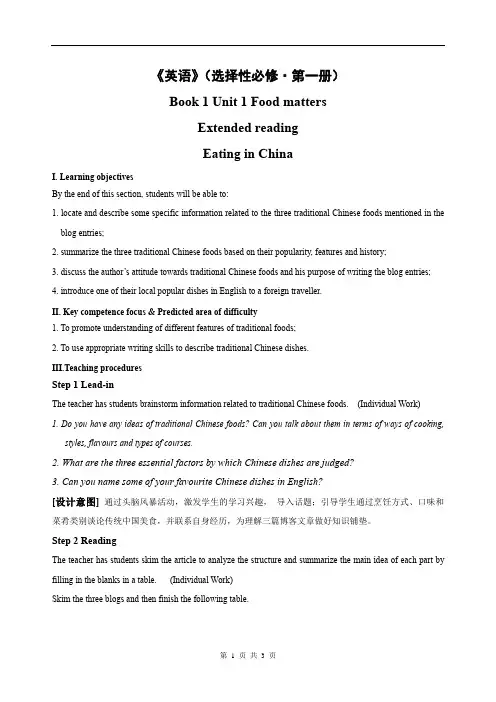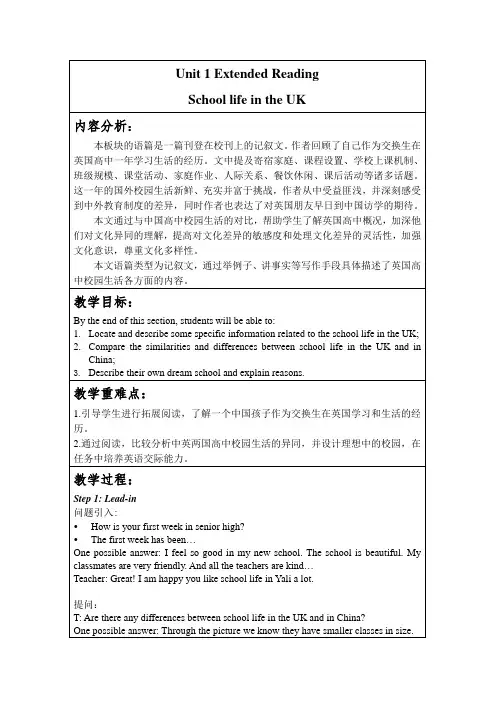高中英语译林牛津新版 模块一unit 1 Extended reading
- 格式:doc
- 大小:29.50 KB
- 文档页数:1

《英语》(选择性必修·第一册)Book 1 Unit 1 Food mattersExtended readingEating in ChinaI. Learning objectivesBy the end of this section, students will be able to:1. locate and describe some specific information related to the three traditional Chinese foods mentioned in the blog entries;2. summarize the three traditional Chinese foods based on their popularity, features and history;3. discuss the author’s attitude towards traditional Chinese foods and his purpose of writing the blog entries;4. introduce one of their local popular dishes in English to a foreign traveller.II. Key competence focus & Predicted area of difficulty1. To promote understanding of different features of traditional foods;2. To use appropriate writing skills to describe traditional Chinese dishes.III.Teaching proceduresStep 1 Lead-inThe teacher has students brainstorm information related to traditional Chinese foods. (Individual Work)1. Do you have any ideas of traditional Chinese foods? Can you talk about them in terms of ways of cooking,styles, flavours and types of courses.2. What are the three essential factors by which Chinese dishes are judged?3. Can you name some of your favourite Chinese dishes in English?[设计意图] 通过头脑风暴活动,激发学生的学习兴趣,导入话题;引导学生通过烹饪方式、口味和菜肴类别谈论传统中国美食,并联系自身经历,为理解三篇博客文章做好知识铺垫。



T: Are there any other differences between school life in the UK and in China? Students watch different slides in the PPT and their answers vary.Step 2: Fast ReadingHave students read the article and answer the following questions.•What is the school life like as an exchange student in the UK?•What aspects might be introduced?Listen and check the aspects mentioned.Step 3: Detailed ReadingListen to the recording of the text and decide whether the following statements are true or false by discussing:1. I stayed in Britain with a host family whose son is called David.2. The host family were friendly to me and we got on very well.3. The British school day starts at 8:00 am and finishes at 5:00 pm.4. There are about 50 students in each class in British school.5. I found Math quite challenging because the material was more advanced in the UK than in China.6. I couldn’t make much contribution in class discussion because I was too shy.7. There were lots of options in the dining hall.8. The club that most interested me was basketball club.Answers: F, T, F, F, F, F, T, F.Read the text carefully and answer these questions.1. What challenges did John come across?2. How did he overcome them?Possible answer:1. He wasn’t able to express himself clearly in English.2. Fortunately, his teachers and classmates were always helpful and gave him a lot of encouragement. His language skills improved over time.Further readingHow does John like the school life in the UK?Possible answer: He is glad to have the opportunity to experience this different way of life.Step 4:Understanding the textWhat is the type of the article, a narration, an argumentation, or an exposition? Answer: A narration is a story or account of events.Analyze the structure of the narrationStep 5:SummarySummarize the main idea of the article with about 50 words.Requirement: Include those 5 elements in your summary: who, when, what, where, how.Possible answer:John Li, who studied at a British secondary school as an exchange student a year ago, introduces to us different aspects of the school life in the UK, including timetable, subjects, classes and so on. He also talks about the challenges he faced and feels glad to experience the life.Step 6:Free talkWhat is your dream school like?Requirement:•Include at least 2 of the aspects talked about in this period.•List some qualities you expect from the students and teachers.。







Unit 1 Back to school
Extended reading
School life in the UK
Last year, I had the chance to study at a British secondary school as an exchange student. I stayed with a lovely host family and went to school with their son, Daniel. We were both in year ten and we got on well. He is learning Chinese and will come to stay with me this year in China!
The British school day begins at 9 a.m. and ends at 4 p.m. Students usually have to learn nine subjects at secondary school. Every student in the UK must study English, Maths and the Science subjects: Biology, Chemistry and Physics. Students can also choose to study other subjects, such as History, Art and Business.
The classes are different from those in China. Each teacher has their own classroom and the students move around for every lesson. In most of my classes, there were only about 20 students. In the beginning, however, it was still tough for me to remember everyone’s name!
I enjoyed most of the classes, but some of them were quite challenging. Technology classes were fun. I made a clock to take home. The teacher helped me put the parts together. I like it so much that I still use it as my alarm! I found Maths quite easy and enjoyable because the material was less advanced in the UK than in China.
However, learning in English was a great challenge for me. There were a lot of difficult English words, especially in Geography and Biology. Class discussion is very important in the UK, but I could not make much of a contribution because sometimes I wasn’t able to exp ress myself clearly in English. Although there was not as much homework as I was used to, it was still challenging. Fortunately, my teachers and classmates were always helpful and gave me lots of encouragement.My language skills improved over time.
During the hour-long lunchtime, I ate in the school dining hall. There were lots of options including bread and butter, chicken pie and puddings, but I still missed my mum’s cooking! After lunch, I often played on the school’s huge sports field with Daniel and his friends. Sometimes we just relaxed under a tree or sat on the grass. After school, there were many clubs to join. The one that attracted me most was the Rugby Club. We played once a week, and it was really fun. Also, I enjoyed acting in the Theatre Club. I still have photos of myself acting in William Shakespeare’s A Midsummer Night’s Dream. Joining clubs was a great way to meet British students and make friends with them.
I am glad to have the opportunity to experience this different way of life. I met some great people and learnt a lot about school life in the UK. Daniel and his family were fantastic hosts, and his friends were very nice as well. I can’t wait for Daniel to visit China!。